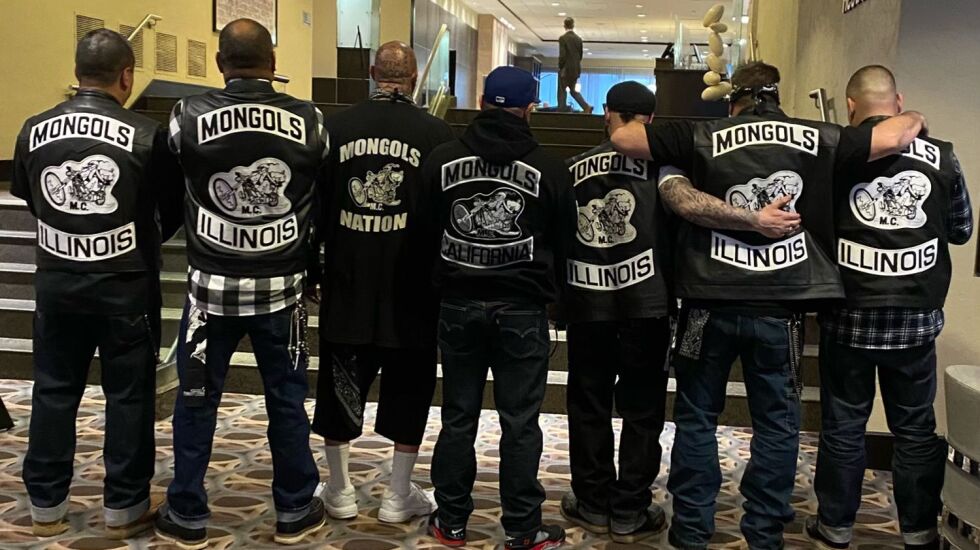
Early on Nov. 6, four Outlaws members and a member of the Mongol Nation Motorcycle Club were shot at a bar in Archer Heights on the Southwest Side where the Mongols were celebrating a birthday, according to Chicago police reports.
As many as 20 Outlaws members walked in to Tony O’s Studio 31 Lounge at 5147 S. Archer Ave., near Midway Airport, looking for payback for a shooting last year, a law enforcement source says.
According to police reports, the Mongols shot one of the Outlaws, a 34-year-old suburban man, in the left elbow. That man and a high-ranking Outlaw also had been shot on Feb. 27, 2021, during a brawl with the Mongols in Berwyn.
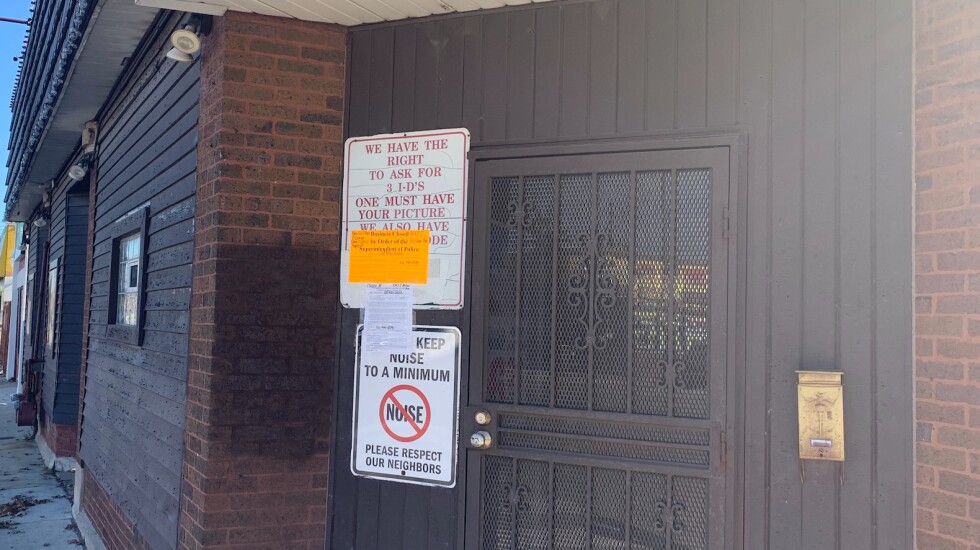
Most of the bikers who were shot Nov. 6 weren’t seriously injured, but a 56-year-old Outlaws member, a convicted killer, was left in critical condition after being shot in the chest. A 51-year-old Bridgeport man, the only Mongol member wounded, was shot in the right arm, according to police reports and court records.
After the shootout at Tony O’s Studio 31, people in the bar cleaned up the evidence, including shell casings, according to a law enforcement source.
The wounded bikers haven’t cooperated with detectives, and no one has been charged, according to the source, who says no guns were found at the bar.
Based in California, the Mongols arrived in Chicago in the past few years, antagonizing Outlaws members, who consider the city their territory.
Before the 2021 shooting in Berwyn, the Mongols paraded their motorcycles around the Outlaws’ South Side fortress at 25th Street and Rockwell Avenue in an act of provocation, law enforcement sources say.
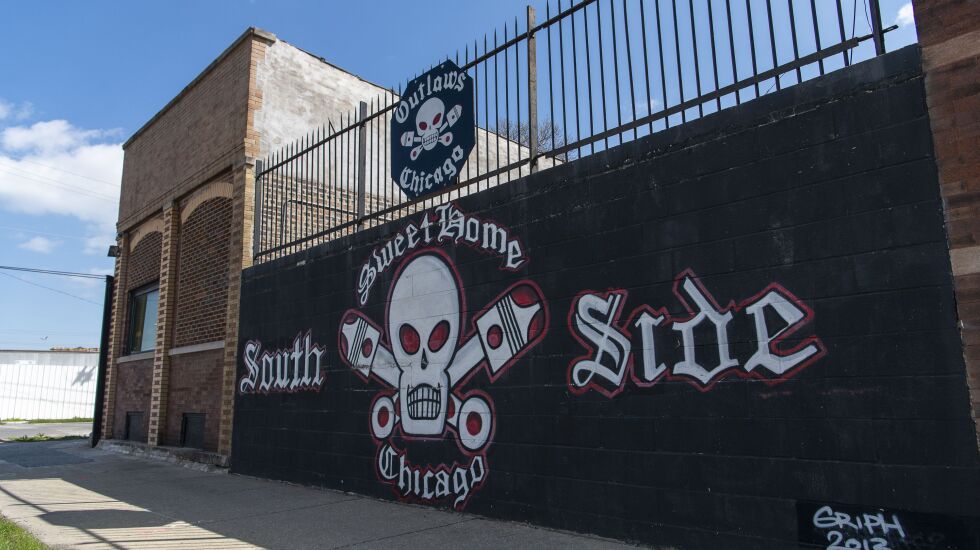
Chicago police officers have been warned to watch for retaliatory violence since the shooting at Tony O’s Studio 31.
On Tuesday, the police department closed the bar as a public-safety nuisance. Under a city ordinance, the bar will remain closed for up to six months while the owners can work out a plan to improve safety in the bar. The owners couldn’t be reached.
David Santillan, the longtime president of the Mongols until he was ousted by members last year, says he was among those who decided to bring the Mongols to Chicago. It was a logical expansion but wasn’t intended as a provocation against the Outlaws, the former Mongols leader says.
Unlike the Outlaws, his group recruits mostly younger, Latino members, Santillan says. “We don’t fish out of the same pond. We’re looking at a different demographic.”
Besides, he says, “If you’re our friends and we coexist in other areas, why can’t we coexist in Chicago?”
Santillan sees the reaction from the Outlaws as part of a “whose d---’s bigger contest.”
“They feel like they have to defend their real estate,” he says, calling the shootings “unfortunate” but saying they could have ended up being much worse.
“A bunch of guys could have ended up dead,” Santillan says, describing the Outlaws as the “aggressors” in Chicago.
He predicts more problems, saying the Outlaws don’t want to look weak: “There’s a lot of bad blood brewing.”
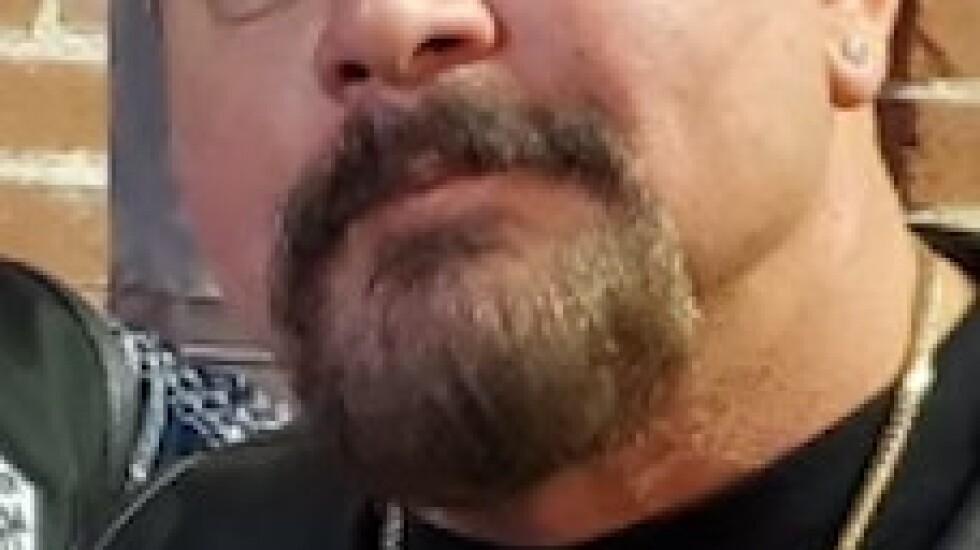
“Nobody wants to go down that road,” Santillan says. “They’re not happy with us being here. But, if you haven’t chased us out of town in three years, we’re not going anywhere.”
Outlaws leaders didn’t return calls or declined to comment. “This is news to me,” one says of last weekend’s shooting.
The Outlaws Motorcycle Club was founded in 1935 at a Route 66 bar in McCook and later moved into Chicago, according to the group’s online history, spreading to become one of the country’s biggest, baddest biker clubs along with the Hells Angels, Pagans and Bandidos.
Those groups’ members call themselves “1-percenters” because they say they represent the tiny subset of motorcycle riders who aren’t law-abiding.
They have at times found themselves violently at odds over territory, the drug trade or ego. But they’re united in a philosophy: open disdain for authority and societal norms and a willingness to break the law.
The Outlaws and Hells Angels have both weathered federal prosecutions and accusations that they’re gangs on wheels involved in drug dealing and mayhem.
In the 1990s, they were locked in war in Chicago as the Hells Angels tried to make a foray into the city, the Outlaws’ turf.
After bombings, shootings and stabbings, the clubs reached a fragile truce, with the Hells Angels — formed in 1948 in California — giving up their attempt to put a clubhouse within Chicago city limits, instead planting a flag in Harvey.
The Mongols share a hatred of the Hells Angels, with whom they fought at a Laughlin, Nevada, casino in 2002, with three people killed.

The Outlaws’ and Mongols’ shared dislike for the Hells Angels helped them form a loose alliance at times.
George Christie, a former Hells Angels leader who left the group in 2011, recalls seeing Outlaws in California in the 1990s visiting “as a guests of the Mongols — and that disturbed us. Ultimately, I was told that they didn’t have a lot in common.”
Steve Cook, executive director of the Midwest Outlaw Motorcycle Gang Investigators Association, says the Mongols, like their allies the Pagans, have been “branching out” in recent years.
Cook says of the Mongols’ incursion into Chicago: “The Outlaws already told them ‘no,’ and they did it anyway. They basically thumbed their nose at them.”
Santillan says that he and a couple of other veteran Mongols — including one who helped the group expand into Missouri and southern Illinois — were leaders in that process, but “nothing gets done without a vote” by members, who decided: “Let’s do it.”
Though Mongols have been wearing their insignia in Chicago, they apparently haven’t established a clubhouse in the city.
In addition to their Rockwell Avenue clubhouse, the Outlaws have one on Chicago Avenue on the West Side, called the “North Side” chapter.
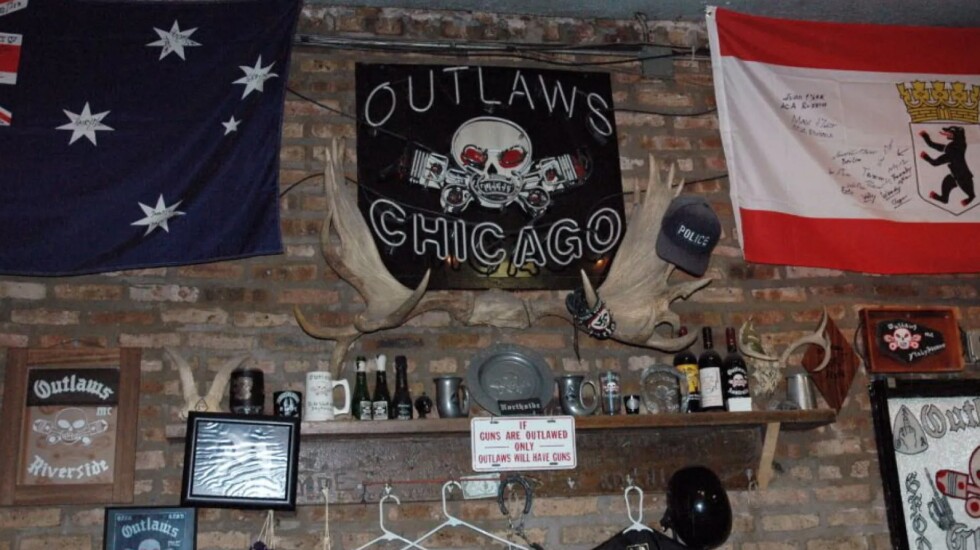
While there have been racketeering cases involving Chicago-area Outlaws in the past, things have been relatively quiet lately on the legal front.
But not so for the Outlaws and Mongols in other parts of the country. In California, prosecutors went after the Mongols in a racketeering case that, earlier this year, saw the club accuse Santillan of being a federal informant — which he denies.
In Buffalo, New York, the federal prosecution of a strip club owner on drug-trafficking, sex-trafficking and bribery charges revealed the club’s general manager is the reputed international president of the Outlaws, though he wasn’t charged.







